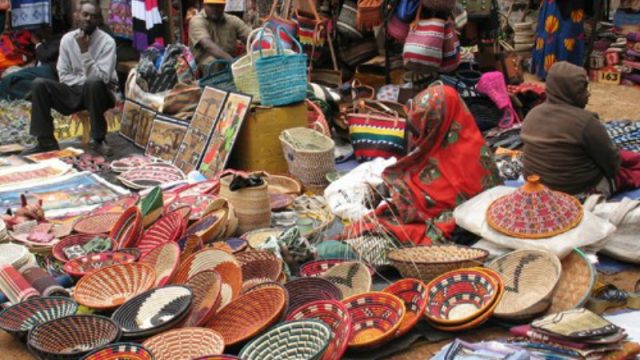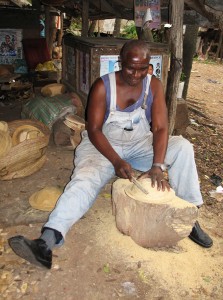Whether you settle on a mask, a soapstone bowl, a Maasai shuka, a carving of an elephant, or an intricate beaded necklace, one of the benefits of buying traditional crafts in Kenya is that it allows you to support the excellent craftsmen (and women) of the country. As a bonus, many shops allow visitors to watch artisans work. Here are some of my favorites.
Kazuri Beads – Nairobi
Kazuri, which means “small and beautiful” in Swahili, produces handmade ceramic beads and pottery in a factory located on what used to be Karen Blixen’s coffee plantation on the outskirts of Nairobi. It was founded in 1975 by Lady Susan Wood (the daughter of English missionaries in Kenya) as a workshop to employ Kenyan women (mostly single mothers who’ve been abandoned by their husbands or widowed by the AIDS epidemic) who had trouble finding jobs. Now more than 400 work there (including a few men), producing fair trade beads and tableware for customers in 30 countries around the world.
The beads come in a variety of styles and seemingly endless colors from neutral whites, blacks and beige to riotous yellows, reds and purples. Some are single hues; others have dots or stripes squiggles. Some have an elegant iridescent sheen or a touch of gold. They’re strung in a multitude of patterns and hung in color families in their shop. You can match necklaces to bracelets and earrings or mix it up. You can gather up a set of dishes (my favorite have a lion paw decorative motif) to have them ship home for you.
Visitors can take a factory tour, watching the women shape and glaze the beads and other items, including tableware and small African animals, using clay from the Mount Kenya area. Watching them string the beads for placement in the kiln is a reminder of just how much painstaking handwork goes into their creations.
If your time in Nairobi doesn’t allow a jaunt out to the Kazuri factory in the Karen neighborhood, you can find shops featuring Kazuri pottery and beads elsewhere in town, including the Westgate Mall, Village Market, and downtown on Mombasa Road.
Akamba Handicraft Industry – Mombasa
Down on Kenya’s east coast, the wooden gates of the Akamba Handicraft Industry Cooperative Society are not far from the airport in Mombasa. A cooperative, they claim to employ some 10,000 workers, half of whom do their carving in an open-air workshop that also includes an enormous store with at least one of everything they make. They specialize in traditional — especially wooden — crafts.
Shoppers can stroll through the hundreds of workshops — dodging saws, hammers and metalsmith’s fires — and you’ll see master carvers fashioning sculptures of animals and people, making traditional masks or abstract forms, or working on wooden utensils, such as bowls, spoons, stools, walking sticks and napkin rings. Each artisan has a specialty and his own preferred medium, be it wood, soapstone or metal.
Because each item at Akamba is handmade, each reflects the skill and vision of its creator (no two items are exactly alike). You’re not allowed to purchase directly from the artisan, tempting though that may be as you talk to them on your tour, but the shop has extensive selections — it sells wholesale as well as retail, and they’d be delighted to ship that life-size leopard back home for you.
Maasai Market – Nairobi
There’s something about the color red that catches the eye, and the brilliant red plaid fabrics favored by the Maasai no doubt will catch your attention wherever you go in Kenya. The Maasai (one of Kenya’s tribal groups) used to wear animal skins (primarily cattle hide). Now their main garment (a distinctive wrap) is made from cotton. Called a shuka, this rectangle of fabric is packaged and sold to tourists in every hotel gift shop across the country, but if you want to see the full range of colors and plaids, head to a Maasai market in Nairobi.
Perhaps the largest is scheduled every Friday outside the Village Market shopping center in the Gigiri/Highridge neighborhood. This informal market of Maasai vendors is like a summer artists’ market in the United States, except that instead of pastel watercolors and hand-stitched frilly aprons you’ll find intricately appliquéd cloth wall hangings, hand-painted wooden birds, “antique” masks (which, truth be told, were probably made last week rather than last century), necklaces of tiny colorful beads strung on wire, batiks, knives, hand-crafted flip-flops, chess sets where the pieces are animals, shields and baskets woven from savannah grasses, painted ostrich eggs — well, you get the idea.
This is a good place to buy a Maasai shuka, because every color combination will be on display. Although red is the dominant color, there also are shukas in shades of green or blue. Your choice.
Nothing’s priced and everything’s negotiable, so you need to do a bit of walking around and talking about prices before deciding to make a purchase. Often the person who made the basket or the necklace is sitting right there making more of his or her specialty, and it’s always fun to buy from the producer (you’ll usually get a big smile as part of the bargain). Hours are (more or less) 8 a.m. to 3 p.m.
Other shops in Nairobi
If you prefer your souvenirs to be vetted, there are two good places to browse in Nairobi. In the central business district, check out the Zanzibar Curio Shop on Moi Avenue. Everything has a price tag and the quality level is good. Even if you’ll be venturing elsewhere to shop, it’s a good idea to stop in here first to get a benchmark for your favorite category of souvenir.
The other spot is the gift shop in the Nairobi National Museum atop Museum Hill. The shop is small and the items few, but each is carefully crafted and of high quality. Across the courtyard from the museum entrance are a handful of privately-owned shops with all sorts of items on offer.





